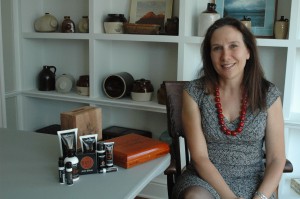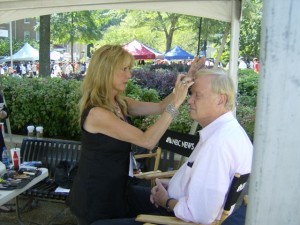
More and more, men are facing up to the fact that image plays a key role in today”™s fiercely competitive job market.
And this is boding well for the cosmetics industry.
“Men are beginning to pursue taking better care of themselves and much of that is due to today”™s competitive work environment,” said Pamela Viglielmo, executive vice president of Mënaji in Southport, a company that develops makeup and skincare products for men.
Mënaji recently did market research to define interest areas and found that next to medical conditions, such as adult acne and rosacea, professional presentation was one of the major reasons males buy cosmetics.

“You”™d be surprised at how many men are reaching into their wife”™s makeup bag for some sort of cover-up,” said Viglielmo. “Men”™s skin is oilier, so if you”™re one of the many men reaching for your wife”™s compact you”™re really not doing the best.”
According to a recent study by the Journal of Economic Psychology at the University of California, “good-looking” men will earn about 12 percent more than their less-attractive counterparts over the course of their careers.
This comes as no surprise to Viglielmo.
“These are just tools,” she said. “Most guys shave and do their hair, and this is just an extension of that.”
”˜A personal brand strategy”™
Viglielmo and her husband, Jim Fisher, CEO of Mënaji, invested in the company last year after researching the industry and determining its growth potential. Since then the company has doubled its sales volume.
Though she declined to disclose sales data, Viglielmo described the company as “a small, but rapidly growing ”˜niche brand.”™”
The company has also consolidated its formulating, fulfillment and warehouse centers to Connecticut, New Jersey and New York from Tennessee and surrounding Southern states.
Mënaji was founded 10 years ago by Nashville-based Michele Probst, a professional fashion and film makeup artist with a celebrity clientele. Probst is president of the company.
According to the U.S. Bureau of Labor Statistics, of the 14 million unemployed people in the U.S. there are about 126,000 more adult men out of work than women.
Mary Rosenbaum, founder and president of Manhattan-based Your Career by Design, a career coaching company, said clients have begun to show strong interest in minute details of their appearance.
“One of the key elements to a personal brand strategy is to constantly convey what you would like you as your brand to represent,” she said.
Rosenbaum said male cosmetics are something she has been watching develop for years.
“They are finally coming to the forefront, but it is certainly the next evolutionary step on how men present themselves,” she said. “You can”™t just throw on a suit anymore.”
Mënaji”™s products are available at high-end retail stores like Nordstrom and Bloomingdale”™s, but the majority of sales are done online directly through the company”™s website and through secondary vendors.
Catering the male market
According to Chicago-based market research company Mintel, about 60 percent of men aged 20 to 50 prefer to shop online for grooming products and 85 percent find buying cosmetic products from a store counter to be intimidating.
Mënaji advertises online and in print and does speaking engagements and TV shows to demonstrate its products. About 80 percent of the company”™s sales are in the U.S., with the remainder overseas including the U.K., France, Sweden, Denmark, Australia, Hong Kong, Canada and west African countries. Mënaji has even adopted the practice of mailing its products in reclaimed wooden cigar boxes to disguise the contents and create a masculine appeal.
“If you say ”˜makeup,”™ men get scared,” said Viglielmo. “A lot of our battle is to get men to try the products.”
As a strategy to hook male consumers, the brand offers lip balm as its “gateway product.”
To further entice male consumers, Mënaji calls its products masculine-leaning names like “Camo” and “Agent” and uses black and brown packaging.
”˜A whole untapped area”™
Viglielmo said large companies like Unilever and Proctor and Gamble opened the door to the men”™s market.
Proctor and Gamble announced in its 2010 year-end report its 18th consecutive quarter of growth in men”™s grooming.
“All of a sudden you saw the Axe and the new Old Spice lines focused directly at young men,” said Viglielmo. “Boys ages 11 and 12 began to be told products that were essentially disguised as body and beauty care products should be part of their regiment.”
According to international market research company Euromonitor International, Americans on average spend $5 billion a year on men”™s grooming products and that is growing every year; in the mid-1990s that number was about half. The company found that global sales of men”™s grooming products were valued at $29 billion in 2010, up 7.4 percent from 2009; it identified men”™s skincare is the star performer, with 12 percent growth in 2010.
“It”™s really given new lifeblood to a stalled industry,” said Viglielmo. “There”™s nothing new out there for women in terms of product. Men”™s cosmetics are a whole untapped area.”




















Great article. Menaji has terrific products.
You can certainly see your skills within the work you write. The sector hopes for more passionate writers such as you who aren’t afraid to mention how they believe. Always go after your heart.